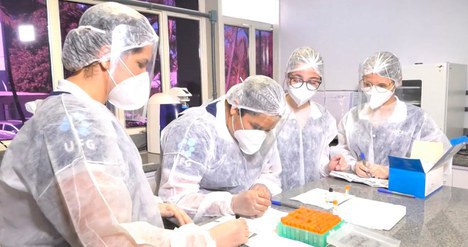courses
Share: Share via Facebook Share via TwitterLink to Copy to Clipboard
Posted on 02/25/2022 14:17
2022 concession will benefit 1,900 courses
Starting this year, courses related to Humanities, Exact, Technological and Multidisciplinary, and Life Sciences will have the same initial level of aid - Photo: CAPES
In 2022, CAPES equaled the minimum amounts of scholarships that each postgraduate program will be entitled to, regardless of the college of the assessment areas. Starting this year, courses related to Humanities, Exact, Technological and Multidisciplinary, and Life Sciences will have the same initial level of aid. The correction was made at the request of Cláudia Queda de Toledo, president of the Foundation, so that the model is egalitarian for all areas. “We don't have to differentiate, but consolidate a model that promotes equality in granting scholarships”, she argues.
With the new criteria, published this Friday, 25, in the Official Gazette, the concession model will benefit 1,900 courses, without prejudice to the others. Thus, a master with grade 4 in the evaluation will initially have 8 scholarships in any of the three colleges. By the criteria in force in 2020 and 2021, this same course would have a smaller number of scholarships in the areas that form the Humanities and Life Sciences.
With the model, created in 2020, the granting of benefits started to take into account, in the redistribution of all scholarships (about 84 thousand), the grade obtained in the evaluation, the level of the course (master's and doctorate) and the weighting of two factors: the Municipal Human Development Index (IDHM), to prioritize municipalities with lower indicators, and the Average Course Title (TMC) factor, whose purpose is to differentiate courses by size.
For this year, CAPES also changed the limitation for gains and losses of scholarships in the redistribution of the total of benefits destined to the master's and doctorate courses. The maximum reduction remains at 10%, but for the increase there have been changes. Grade 6 and 7 courses are without earnings limitation, criteria that only met courses 7. Grade 5 courses had an increase in the rate of gain from 40% to 55%, grade 4 courses from 20% to 45% and grades 3 or grade A from 20% to 25%.
Thus, taking into account the limitation for earnings, a master's course, for example, grade 6 in the evaluation, which initially, by the distribution criteria, would be entitled to 13 scholarships, but which currently has six scholarships, will receive the 13 scholarships, because, as it is a grade of six, there is no ceiling for increasing the total benefits.
Implemented gradually, the model corrected distortions generated in previous grants. At the time the criteria were created, for example, similar doctoral courses (same grades, area of knowledge and geographic location) with very different number of scholarships were identified. Courses of excellence were also observed with a lower number of scholarships than courses with the minimum allowed grade.
The model combines the granting of scholarships with the results of the evaluation, valuing academic performance. It also complies with the determination of the National Education Plan (PNE), with the expansion of investment in doctoral courses and the promotion of the reduction of regional inequality.
The rules are valid from March 2022 to February 2023 and for scholarships awarded in the country through the Social Demand Programs (DS), Academic Excellence Programs (Proex), Graduate Support Programs for Private Education Institutions ( Prosup) and Postgraduate Support for Community Higher Education Institutions (Prosuc).
In cases where the distribution of scholarships reduces the number of benefits being used in February 2022, CAPES will grant the scholarships on a loan basis. The measure ensures the maintenance of all existing scholarships.
CAPES
The Coordination for the Improvement of Higher Education Personnel (CAPES), a foundation of the Ministry of Education (MEC), plays a fundamental role in the expansion and consolidation of stricto sensu graduate studies (master's and doctoral degrees) in all states of the Federation. In 2007, it also started to work in the training of basic education teachers, expanding the reach of its actions in the training of qualified personnel in Brazil and abroad.
.

 Mr. Alessandro Jacob speaking about Brazilian Law on "International Bar Association" conference
Mr. Alessandro Jacob speaking about Brazilian Law on "International Bar Association" conference